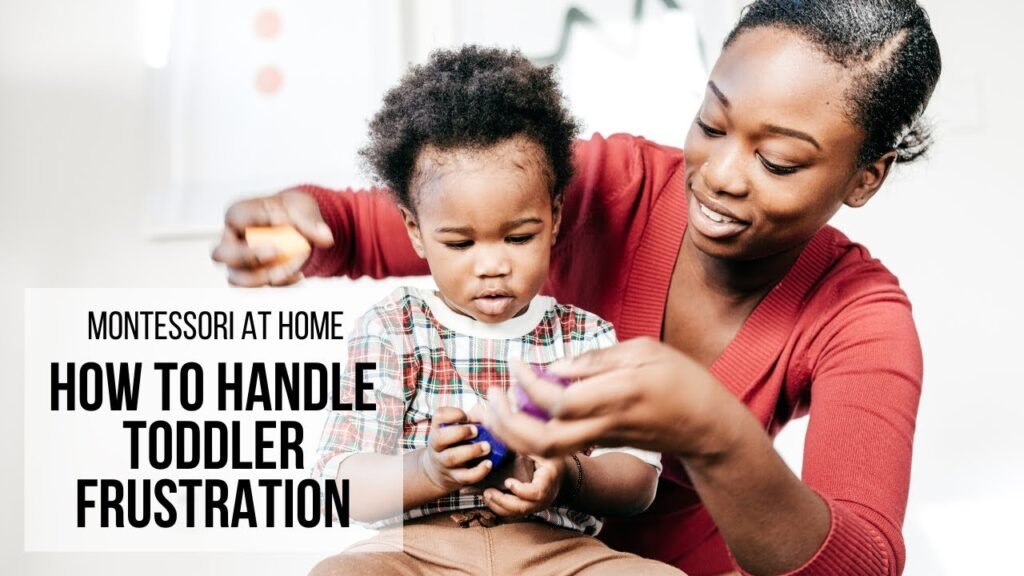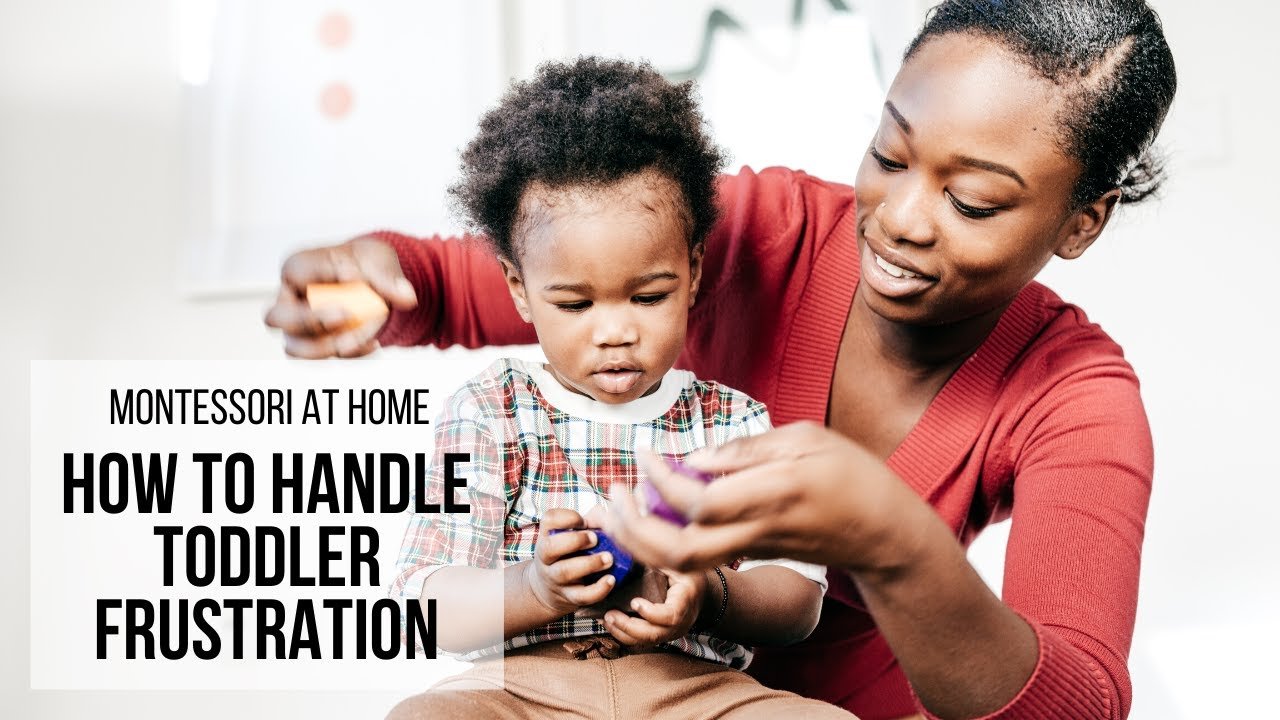Hi there! If you find yourself feeling a bit lost when it comes to helping your frustrated toddler in a Montessori home, you’re not alone. Ashley, a mom of two little girls, knows just how challenging it can be to navigate through those big feelings of frustration that toddlers experience. In her video, she shares some valuable tips on how to handle these situations with grace and understanding.
Ashley’s key tip is to reassure the child that it’s okay to feel frustrated, allowing them to explore their emotions in a safe and supportive environment. By reframing the idea of frustration and providing opportunities for toddlers to work through challenges independently, parents can help their children build important skills like focus, concentration, and persistence. With a little patience and a lot of love, parents can create a positive Montessori environment where toddlers can thrive and grow.

Understanding Toddler Frustration
Toddlers’ Emotional Development
Toddlers’ emotional development is a crucial aspect of their growth, as they begin to navigate various feelings and emotions. Frustration is a common emotion that toddlers experience as they learn to handle challenges and setbacks. Understanding the emotional development of toddlers involves recognizing that they are still learning to regulate their emotions and express themselves effectively.
Triggers of Frustration in Toddlers
Toddlers can become frustrated for a variety of reasons, including not being able to communicate their needs effectively, struggling with new tasks, feeling overwhelmed by sensory input, or experiencing changes in their routine. It is essential to identify these triggers to help toddlers navigate their emotions and develop coping mechanisms.
Effects of Frustration on Toddlers
Frequent frustration in toddlers can lead to tantrums, aggression, withdrawal, or other challenging behaviors. Understanding the effects of frustration on toddlers can help parents and caregivers support them in managing their emotions effectively. It is crucial to address frustration early on to promote healthy emotional development in toddlers.
Creating a Calm Environment
Maintaining a Consistent Routine
Consistency in routines can help toddlers feel secure and reduce instances of frustration. Establishing a predictable schedule for meals, naps, playtime, and bedtime can provide toddlers with a sense of stability and control. By maintaining a consistent routine, parents can create a calm environment that supports emotional regulation in toddlers.
Providing Adequate Physical Activity
Physical activity is essential for toddlers to release excess energy and maintain good emotional health. Regular exercise can help reduce frustration, improve mood, and promote better sleep quality. Offering opportunities for active play and outdoor exploration can support toddlers in managing their emotions effectively.
Offering Quiet Time for Rest
Quiet time for rest and relaxation is vital for toddlers to recharge and unwind. Creating a peaceful environment with soft lighting, soothing music, and cozy blankets can help toddlers calm down after a busy day. Encouraging quiet activities like reading, drawing, or listening to calming stories can promote emotional well-being in toddlers.
Encouraging Independence
Setting Up Child-friendly Spaces
Creating child-friendly spaces at home can empower toddlers to explore and engage independently. Designing low shelves, accessible materials, and open-ended toys can encourage toddlers to make choices and engage in self-directed activities. Providing a safe environment that promotes independence allows toddlers to develop confidence and autonomy.
Promoting Self-directed Activities
Encouraging toddlers to engage in self-directed activities fosters creativity, problem-solving skills, and independence. Offering open-ended materials like blocks, puzzles, and art supplies can inspire toddlers to explore, experiment, and create on their own. Allowing toddlers to make decisions and follow their interests promotes a sense of achievement and self-confidence.
Encouraging Decision-making
Inviting toddlers to make simple choices throughout the day can boost their confidence and decision-making skills. Offering limited options for selecting clothes, toys, snacks, or activities allows toddlers to practice making decisions independently. Encouraging toddlers to express their preferences and opinions promotes a sense of autonomy and self-reliance.
Modeling Positive Behavior
Demonstrating Patience and Empathy
Modeling patience and empathy in stressful situations can teach toddlers valuable social and emotional skills. Demonstrating a calm and understanding attitude when toddlers experience frustration can help them learn to regulate their emotions effectively. Showing empathy towards toddlers’ feelings and needs fosters a positive and supportive environment.
Using Positive Language and Tone
Communicating with toddlers using positive language and a gentle tone can enhance their emotional well-being. Using words of encouragement, praise, and reassurance can build toddlers’ confidence and self-esteem. Speaking respectfully and conveying positive messages can strengthen the parent-child bond and promote a harmonious relationship.
Practicing Calmness in Stressful Situations
Maintaining a sense of calmness and composure during stressful situations can set a positive example for toddlers to follow. Managing one’s emotions effectively and using healthy coping strategies can help toddlers learn how to navigate challenges without becoming overwhelmed. Demonstrating self-control and resilience in challenging moments can teach toddlers valuable life skills.
Effective Communication Strategies
Active Listening to Understand Toddler’s Feelings
Active listening involves paying attention to a toddler’s verbal and nonverbal cues to understand their emotions and needs. Engaging with toddlers, maintaining eye contact, and responding empathetically can validate their feelings and promote effective communication. Acknowledging and reflecting on toddlers’ emotions can help strengthen the parent-child connection.
Using Simple and Clear Instructions
Communicating with toddlers using simple and clear instructions can help them understand expectations and tasks. Using short sentences, visual cues, and gestures can enhance toddlers’ comprehension and cooperation. Providing step-by-step guidance and positive reinforcement can support toddlers in following directions and completing activities successfully.
Encouraging Verbal Expression of Emotions
Encouraging toddlers to express their emotions verbally can help them communicate their feelings effectively. Teaching toddlers to use words to describe their emotions, such as happy, sad, or frustrated, can enhance their emotional awareness and vocabulary. Creating a supportive environment for toddlers to express themselves verbally fosters healthy emotional development and communication skills.
Teaching Problem-solving Skills
Guiding Toddlers to Identify Problems
Guiding toddlers to identify and recognize problems can help them develop critical thinking and problem-solving skills. Asking open-ended questions, encouraging curiosity, and exploring solutions together can empower toddlers to approach challenges creatively. Guiding toddlers through the process of problem-solving builds their confidence and resilience.
Encouraging Trial-and-error Approach
Encouraging toddlers to explore and experiment through a trial-and-error approach can help them learn from mistakes and setbacks. Allowing toddlers to try different solutions, make decisions, and learn through experience fosters independence and problem-solving skills. Embracing the learning process and celebrating efforts can motivate toddlers to persist and overcome obstacles.
Celebrating Successes and Efforts
Celebrating toddlers’ successes and efforts, no matter how small, can boost their self-esteem and motivation. Praising toddlers for their achievements, progress, and problem-solving skills can reinforce positive behavior and self-confidence. Recognizing toddlers’ hard work, creativity, and resilience encourages them to continue learning and growing.
Offering Choices and Positive Reinforcement
Presenting Limited Options for Decision-making
Offering toddlers limited options for decision-making can help them feel empowered and confident. Providing choices for activities, snacks, toys, or clothing allows toddlers to practice making decisions independently. Presenting structured choices and encouraging toddlers to express their preferences fosters a sense of autonomy and self-control.
Using Encouragement and Praise for Efforts
Using encouragement and praise to acknowledge toddlers’ efforts and accomplishments can reinforce positive behavior. Praising toddlers for trying new tasks, solving problems, and demonstrating resilience can boost their self-esteem and motivation. Offering specific and genuine praise for toddlers’ hard work and progress encourages them to continue exploring and learning.
Avoiding Punishments and Criticisms
Avoiding punishments and criticisms can create a supportive and nurturing environment for toddlers to thrive. Instead of focusing on mistakes or misbehavior, emphasizing positive reinforcement and guidance can promote healthy emotional development. Encouraging toddlers to learn from their experiences and make positive choices fosters a sense of responsibility and self-discipline.
Promoting Emotional Regulation Techniques
Teaching Deep Breathing and Relaxation Techniques
Teaching toddlers deep breathing and relaxation techniques can help them calm down and manage their emotions effectively. Encouraging toddlers to take deep breaths, pause, and relax during moments of frustration can promote self-regulation and stress relief. Practicing deep breathing exercises together can strengthen the parent-child bond and support emotional well-being.
Encouraging Physical Activities for Emotional Release
Encouraging toddlers to engage in physical activities for emotional release can help them channel their energy and emotions productively. Providing opportunities for active play, dancing, or outdoor exploration can support toddlers in releasing pent-up emotions and stress. Engaging in physical activities together can promote bonding and enhance emotional regulation skills.
Modeling Calmness and Self-control
Modeling calmness and self-control in challenging situations can teach toddlers valuable emotional regulation techniques. Demonstrating healthy coping strategies, such as deep breathing, positive self-talk, and mindfulness, can help toddlers learn how to manage their emotions effectively. Modeling calmness and self-control empowers toddlers to develop resilience and adaptive coping mechanisms.
Implementing Montessori Principles
Focusing on Child-led Learning and Exploration
Emphasizing child-led learning and exploration can nurture toddlers’ natural curiosity and creativity. Allowing toddlers to choose activities, materials, and topics of interest encourages autonomy and self-directed learning. Providing a stimulating environment that promotes exploration and discovery fosters toddlers’ love for learning and independence.
Emphasizing Respect for the Child’s Autonomy
Emphasizing respect for toddlers’ autonomy and independence is a core principle of Montessori education. Treating toddlers with dignity, trust, and understanding can foster a sense of respect and self-worth. Encouraging toddlers to make choices, solve problems, and express themselves promotes a harmonious and respectful relationship between parents and children.
Creating a Prepared Environment for Independence
Creating a prepared environment that is safe, accessible, and inviting can support toddlers in developing independence and confidence. Designing learning areas with child-sized furniture, open shelves, and engaging materials empowers toddlers to explore and engage independently. Establishing a prepared environment that fosters independence and self-sufficiency encourages toddlers to take initiative and responsibility for their actions.
Seeking Professional Help if Needed
Recognizing Signs of Persistent Behavioral Issues
Recognizing signs of persistent behavioral issues in toddlers, such as frequent outbursts, aggression, or withdrawal, is essential for early intervention. Monitoring changes in toddlers’ behavior, emotions, or social interactions can help identify underlying issues that may require professional support. Consulting with pediatricians, child psychologists, or therapists can provide insights and guidance in addressing challenging behaviors effectively.
Consulting Pediatricians or Child Psychologists
Consulting with pediatricians or child psychologists can offer valuable resources and support for parents of toddlers experiencing persistent behavioral issues. Seeking professional guidance and advice can help parents understand the root causes of challenging behaviors and develop effective strategies for managing emotions and promoting healthy development. Collaborating with healthcare providers can lead to personalized interventions and recommendations based on toddlers’ individual needs.
Exploring Therapy or Counseling Options
Exploring therapy or counseling options for toddlers experiencing significant emotional challenges can provide additional support and resources. Participating in play therapy, behavioral therapy, or parent-child counseling sessions can help toddlers and parents strengthen their relationship and communication. Seeking professional help can empower parents to address emotional regulation issues, build coping skills, and promote positive behavior in toddlers.
By understanding toddler frustration, creating a calm environment, encouraging independence, modeling positive behavior, utilizing effective communication strategies, teaching problem-solving skills, offering choices and positive reinforcement, promoting emotional regulation techniques, implementing Montessori principles, and seeking professional help if needed, parents can support toddlers in navigating their emotions and developing essential life skills. Supporting toddlers in managing frustration effectively can lay the foundation for healthy emotional development and positive parent-child relationships. Remember, it’s okay to feel frustrated, and by practicing patience, empathy, and resilience, parents can guide toddlers through challenging moments with love and understanding.

